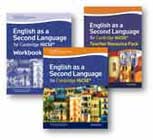Listening exam support for Cambridge IGCSE® English as a Second Language
Build the listening skills required for the latest English as a Second Language for Cambridge IGCSE syllabus, with free assessment support from experienced examiner Dean Roberts.
Teachers tell us it can be challenging to build the complex listening skills now required for the latest English as a Second Language for Cambridge IGCSE syllabus. Build your Cambridge students' assessment confidence with this selection of free talks, interviews, discussions and linked listening activities from the English as a Second Language for Cambridge IGCSE Student Book.
Dean Roberts has arranged the resources by Cambridge listening assessment objectives, so you can focus on building high levels of confidence for all areas of assessment.
Listening assessment objectives 1 & 2: Identify and retrieve facts and details & understand relevant information.
The start of the listening test asks students to listen to 4 short recordings and answer questions on each to show they can select relevant information and identify follow on information. Give your students practice in this skill by playing them this talk from Sonia Hollis, before asking them to complete this 'Study tips' activity.
To give your students additional practice, play them this video interview of Evelyn Glennie before they complete this 'Check your understanding' activity from the English as a Second Language Student Book.
Listening assessment objective 3: Recognise, understand and make connections between ideas, opinions and attitudes.
During the listening test, students will be asked to listen to 6 short extracts and match each speaker to their opinion, based on comments that each one makes about a particular topic or issue. Give your students vital practice in recognising ideas, opinions and attitudes with the following exercise from the English as a Second Language Student Book.
As a warm up activity, split your students into groups of 4 or 5 and ask them to discuss the following opinion for 5 minutes:
We need to develop the transport industry so that it becomes global. The best way to bring people together around the world is without a doubt to make them travel more and visit each other's countries more often.
Then ask them the following questions:
- How many different views were raised within the discussion?
- How many people agreed or disagreed with this opinion?
- What were some of the other, connected, issues that emerged?
After this discussion ask your students to listen to this new rail link discussion before answering these exam-style questions, to build assessment confidence.
Listening assessment objective 4: Understand what is implied but not actually stated.
Help your students to listen for inference and give them confidence tackling multiple-choice questions with this next exercise from the English as a Second Language Student Book. It is useful practice as it demonstrates the 2 types of multiple-choice questions that students may receive. Some will be worded as questions that need a response while the others will require them to complete an unfinished sentence.
Get your students to listen to this interview between Q & James Bond before answering these multiple-choice questions.
As a follow up activity, split your class into pairs and encourage them to create their own multiple-choice questions based on the recording above. This can lead into a wider classroom discussion about what your students have learnt about multiple-choice questions.
Dean Roberts is a teacher trainer and examiner, with over 20 years of teaching experience. He is the author of English as a Second Language for Cambridge IGCSE.
Download Dean's listening assessment audio resources
Download Dean's listening assessment exercises
More listening assessment support for English as a Second Language
Build Cambridge IGCSE English as a Second Language listening confidence
Mapped to the latest Cambridge syllabus, with crucial practice in the complex listening skills now needed for exam success.
-
IGCSE® is the registered trademark of Cambridge International Education.
© 2024 Oxford University Press. All rights reserved.


 Show all resources in Listening exam support for Cambridge IGCSE® English as a Second Language
Show all resources in Listening exam support for Cambridge IGCSE® English as a Second Language 




